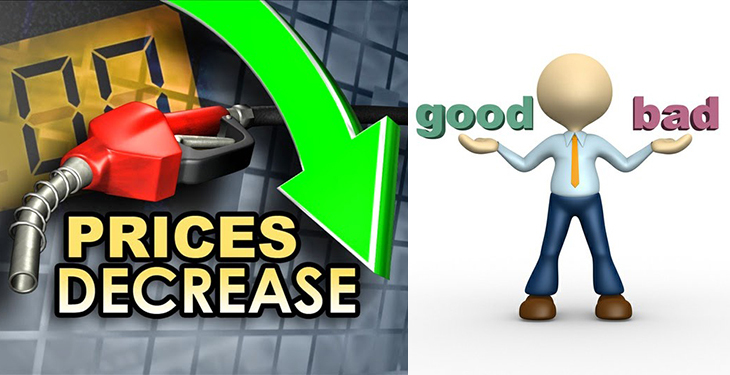Have the cheaper gas prices been a welcome sight? Sure.
Those of us old enough to remember gasoline prices under 30 CENTS per gallon (yes…we are now seasoned citizens) also remember the oil embargo of 1973 that caused price increases and lines at the gas pump. We also remember the oil crisis of 1979 which resulted in shortages around the world, prices doubling overnight, gasoline stations not having fuel for days at a time, and even being limited to buying gasoline on “odd or even days” based upon the last number on our license plates.
The falling oil prices, and much lower gasoline prices, result in the consumer having more money to spend, save, and provide for our families. Lower fuel prices also mean that the cost of transportation of goods to the store will be lower. This could result in lower prices for produce and goods in the stores. Surely all of this is good news! What could be possibly be bad about a situation that increases our disposable income?
Why would the Hoover Institution1, and CNN Business2, recently publish studies explaining how low oil prices could actually damage the US economy? It may not be immediately obvious, we should be hoping for, and looking forward to, times of increasing oil prices. The reasons lie in the “Why?” we have these lower oil prices.
Fifty years ago, the writer took his first college course in economics, “The Pricing System.” This was an entry level course, so it focused solely upon the law of supply and demand. There are many factors that affect prices, but these two are factors are basic. Prices normally drop when either demand for something shrinks or the supply of something grows to overcapacity.
In the case of oil, both of those are happening simultaneously and the factors driving them significantly affect the future economy of the United States.
The aforementioned 1973 oil embargo and the 1979 oil crisis heavily affected the US citizens, because this nation had ceased to produce sufficient oil and imported most of our supply from OPEC and other nations. Because the nations of the Middle East provided much of our consumable supply of oil, any interruption in supply had a sharp impact on the US economy. The OPEC nations decision to impose an embargo on oil shipped to the US in 1973 and the 1979 Iranian Revolution both caused a sudden interruption in US oil supply. With supply low and demand normal, there was a shortage which resulted in significant price increases. In the early 1980’s there were predictions that the world supply of oil would continue to decrease and prices for heating oil, natural gas, and gasoline would soar and cripple the US economy.
Fast forward to 2020 and the world oil supply is vastly different. Due to the technological advances of fracking and horizontal drilling, the US petroleum production from oil shale and natural gas reserves has made the US a net exporter rather than importer of oil. Some political adversaries of Western philosophy and culture have sought to attack this new status by producing much more oil than the world economy can consume.
This is one of the significant reasons that low oil prices is bad. As political adversaries in Russia and the Middle East pump more oil into the system, the price collapse of oil cripples the oil drillers and producers in the Permian, Bakken, and Eagle Ford basins. These companies are now in financial distress, with the first filings for bankruptcy having begun with more on the way.3 These bankruptcies will result in more jobs lost, more home foreclosures, greater losses for those who have loaned the drillers funds to operate, and more. The ultimate goal of our political adversaries is to have the USA return to a nation relying upon imported oil, thus giving these adversaries greater financial power. We need higher prices of oil for our own national economy and security.
The other factor in the oil price collapse is the demand for fuel has not declined, it has cratered. A few months ago, it became obvious that the world economy was slowing while the US economy was continuing to grow. The slower economy was creating a decreasing demand for oil.
Then comes the landing of the “Black Swan” of the Coronavirus, and the first bear market and recession that was caused by something other than normal economic circumstances. The shutdown of the US economy resulted in 20.5 million people losing their jobs in April alone. The lower prices we currently pay at the gas pump is the result of these lost jobs! That is very BAD news.
We should never panic, because we rely upon a God who has this in his hands. Let’s pray for better economic days ahead. Here is to living financially free and pursuing our passions!
1 https://www.hoover.org/research/drop-oil-prices-good-or-bad
2 https://www.cnn.com/2020/03/09/business/oil-prices-us-economic-impact
